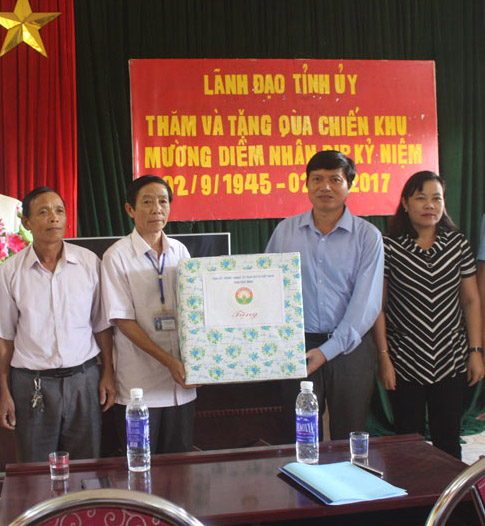
HBO – Vice Secretary of Hoa Binh province’s Party Committee and Chairman of the provincial People’s Council Tran Dang Ninh recently led a delegation to visit and present gifts to locals in Muong Diem and Giang Seo revolutionary bases in Da Bac district, on this occasion of the August Revolution (August 19) and National Day (September 2).

Vice Secretary of Hoa Binh
province’s Party Committee and Chairman of the provincial People’s Council Tran
Dang Ninh visits and presents gifts to people in Muong Diem revolutionary base
(Da Bac).
In early April 1945, following the
direction of the Party Committee of the northern region, the provincial Party
Committee decided to establish the Muong Diem revolutionary base. Thanks to
support from local people, the base’s revolutionary force became stronger and significantly
contributed to the victory of the uprising for administration in August 1945 in
Bo market, Rut spring, and
Vang
street of Hoa Binh province and Moc Chau of Son La
province. Muong Diem revolutionary base was recognised as a national
revolutionary historical relic site in 1996 by the Ministry of Culture and
Sports.
Promoting the revolutionary
tradition, the Party Organisation, authorities and people in Trung Thanh
commune have overcome difficulties and gained significant achievements over the
past years.
Tran Dang Ninh recalled the history
of the two bases, while applauding efforts of the commune’s Party Organisation,
authorities and people to boost socio-economic development.
He expressed his hope that Da Bac
district and Trung Thanh commune to focus resources on fostering socio-economic
development, restore the bases’ stele houses and traditional houses to educate
young generations on the nation’s revolutionary tradition.
Hoa Binh province is undergoing a dynamic transformation amid Vietnam’s national digital transition. Building on Poliburo’s Resolution No. 57-NQ/TW on breakthroughs in science, technology, innovation, and national digital transformation, the province has rolled out a wide range of practical action plans. A standout initiative is the "Digital Literacy for All” movement, an effort to ensure that no one is left behind in the digital era.
Hoa Binh province is undergoing a dynamic transformation in the wake of the national digital transformation movement. Building on Resolution No. 57-NQ/TW of the Politburo on breakthroughs in science, technology, innovation, and national digital transformation, the province has implemented a wide range of practical action plans. A standout initiative is the "Digital Literacy for All” movement ambitious effort to ensure that no one is left behind in the digital age.
With a spirit of unity and proactive problem-solving, the Party Committee, the government and the people of Dong Lai Commune (Tan Lac District) have made great strides in implementing the resolutions of the 24th Party Congress of the commune for the 2020 - 2025 term. Focusing on leadership and practical actions, the commune has brought the Party’s resolutions into daily life, creating strong impacts and pushing the local development forward.
Amid the nationwide push for digital transformation, young people in Hoa Binh Province are stepping up as dynamic pioneers, applying technology to enhance Youth Union operations and expand the reach of youth-led initiatives. Through creativity and adaptability, Youth Union organizations at all levels have introduced a series of practical solutions, contributing to modern governance and community development.
In recent years, An Nghia commune, located in Lac Son district, has stepped up administrative reform, focusing on improving the quality and efficiency of its single-window service unit for receiving and processing administrative procedures. These improvements have helped create favourable conditions for local residents and organisations to handle administrative procedures, contributing to the commune’s broader socio-economic development.
The Prime Minister-approved master plan to develop the multi-use value of forests ecosystems through 2030, with a vision to 2050, aims to improve the management and sustainable use of forest resources, create jobs, increase incomes, and improve the living standards of ethnic minorities, people in mountainous and remote areas, forest workers and those living near forests.



